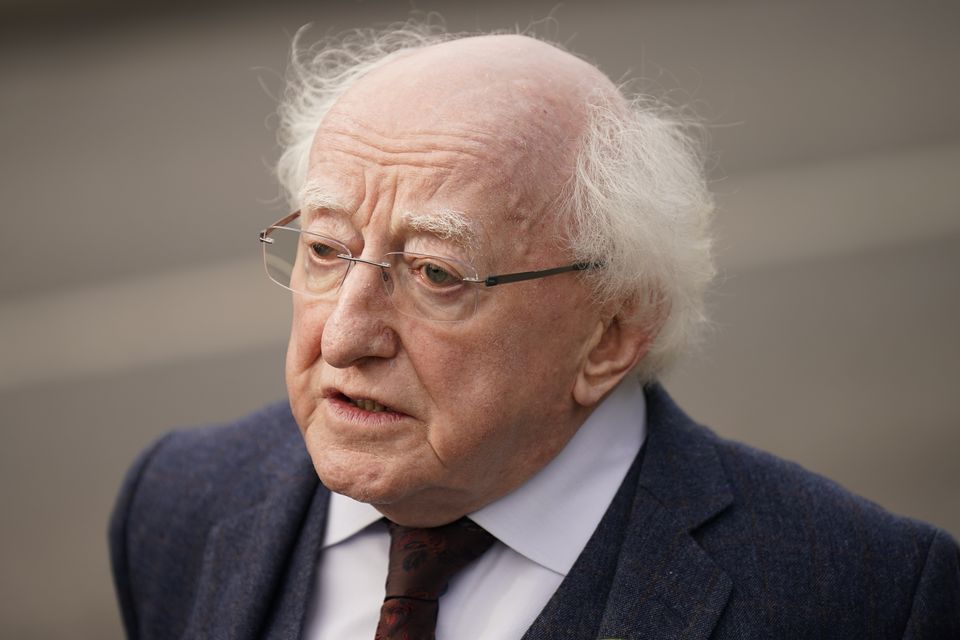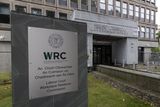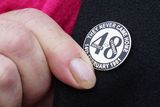President Michael D Higgins says it is ‘not morally acceptable’ to remain silent as humanitarian crisis in Gaza worsens
President Michael D Higgins. Photo: Niall Carson/PA
President Michael D Higgins has called on the international community to ensure the delivery of aid, a ceasefire and the release of all hostages in Gaza as he warned it is “not morally acceptable” for countries to remain silent.
The International Court of Justice (ICJ) has unanimously ordered Israel to take all necessary and effective action to ensure necessary supplies reach those in Palestine in order to prevent the spread of famine.
The court observed that Palestinians in Gaza “are no longer facing only a risk of famine” but that famine is “setting in”.
It comes as the United Nations Security Council voted this week to demand an immediate ceasefire and the unconditional release of all hostages.
In a statement, Mr Higgins said the latest ICJ order “cannot be ignored” and called on all countries to contribute to ensuring aid reaches Gaza, to the delivery of a ceasefire and the release of all hostages.
"Today's new order by the International Court of Justice that Israel ensure the unhindered provision at scale of urgently needed basic services and humanitarian assistance - including food, water and medicine - and open more land crossings in order to prevent the spread of famine and starvation cannot be ignored,” he said.
“It is now not morally acceptable that a single voice would be silent in the European Union or international community, all countries must do all that they can to ensure the immediate delivery of aid, a ceasefire and the release of all hostages in line with this week's UN Security Council resolution,” added the President.
Tánaiste Micheál Martin yesterday announced that Ireland will intervene in the case initiated against Israel under the Genocide Convention at the ICJ.
“As I said in the Dáil last month, intervention as a third party in a case before the International Court of Justice is a complex matter and is relatively rare,” Mr Martin said.
"Since 1948, only four other interstate cases have been initiated under the Genocide Convention before the International Court of Justice.
"Ireland intervened in one of these - the Ukraine v Russia case – and, after a rigorous and comprehensive process of analysis and consultation over the last six weeks, we have determined that we will do so again in the South Africa v Israel case.
“It is for the Court to determine whether genocide is being committed,” said Mr Martin.
"But I want to be clear in reiterating what I have said many times in the last few months; what we saw on 7 October in Israel, and what we are seeing in Gaza now, represents the blatant violation of international humanitarian law on a mass scale.
“The taking of hostages. The purposeful withholding of humanitarian assistance to civilians. The targeting of civilians and of civilian infrastructure. The indiscriminate use of explosive weapons in populated areas. The use of civilian objects for military purposes. The collective punishment of an entire population.
“The list goes on. It has to stop. The view of the international community is clear. Enough is enough. The UN Security Council has demanded an immediate ceasefire, the unconditional release of hostages and the lifting of all barriers to the provision of humanitarian assistance at scale. The European Council has echoed this call,” Mr Martin said.
“The situation could not be more stark; half the population of Gaza face imminent famine and 100pc of the population face acute food insecurity.
"As the UN Secretary General said as he inspected long lines of blocked relief trucks waiting to enter Gaza during his visit to Rafah at the weekend; ‘it is time to truly flood Gaza with life-saving aid. The choice is clear: surge or starvation’. I echo his words today.”
Join the Irish Independent WhatsApp channel
Stay up to date with all the latest news










